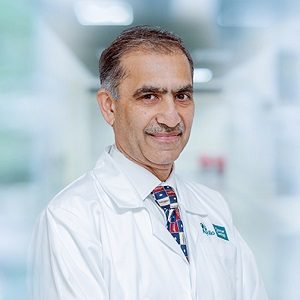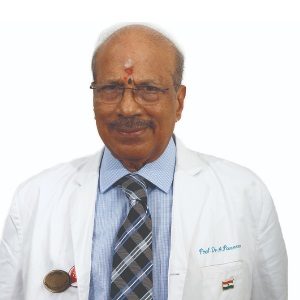Best Gamma Knife Radiosurgery Doctors in India
- Neurosurgeon, Chennai, India
- Over 22 years’ experience
Profile Highlights:
- Dr. Srinivasan Paramasivam is a well-known Neurosurgeon in India having an overall experience of 22 years.
- He is associated with Apollo Hospital, Chennai as a senior consultant – neurosurgeon following his assignments abroad.
- Dr. Paramasivam earned a fellowship in Endovascular Neurosurgery from New York. He has 17 years of specialized experience in Neuro Interventional Surgery, Cerebral Angioplasty, Brain Tumor Surgery, Surgical Clipping, etc.
- Radiation Oncologist, Chennai, India
- Over 30 years’ experience
Profile Highlights:
- Dr. Sanjay Chandrasekar serves as a Radiation Oncology consultant at Apollo Hospital of Chennai. His 30+ years-long journey in this field has brought him a lot of appreciation and recognition.
- He diagnoses cancer and provides treatment for the same.
- Neurologist, Chennai, India
- Over 50 years’ experience
Profile Highlights:
- Dr. Panneer is one of the most renowned Neurologists in India with huge 50+ years of research and clinical experience in the field.
- Dr. Panneer is believed to have expertise in Migraine treatment and neurological disorders management.
- He offers consultation and medical services for Neurosurgery, cerebral angioplasty, Stereotactic Radio Surgery, PBC, Alcohol Withdrawal Syndrome, sleep disorders, skull base surgery, etc.
Best Gamma Knife Radiosurgery Hospitals in India
Fortis Escorts Hospital, New Delhi
- City: New Delhi, India
Hospital Highlights:
- Over the last 33 years, the Fortis Escorts Heart Institute has set new standards in cardiac treatment with groundbreaking research. It is now known around the world as a centre of expertise for Cardiac Bypass Surgery, Interventional Cardiology, Non-invasive Cardiology, Paediatric Cardiology, and Paediatric Cardiac Surgery.
- The hospital has cutting-edge laboratories that perform a wide range of diagnostic tests in Nuclear Medicine, Radiology, Biochemistry, Haematology, Transfusion Medicine, and Microbiology.
- Fortis Escorts Heart Institute boasts a diverse group of bright and experienced doctors who are backed up by a team of highly qualified, experienced, and devoted support professionals as well as cutting-edge equipment such as the recently installed Dual CT Scan.
- Approximately 200 cardiac doctors and 1600 personnel currently collaborate to manage over 14,500 admissions and 7,200 emergency situations each year. The hospital now has a 310-bed infrastructure, as well as five cath labs and a slew of other world-class amenities.
Rela Hospital, Chennai
- City: Chennai, India
Hospital Highlights:
- RIMC is a multi-specialty hospital in a sprawling area of 36 acres located in Chromepet, Chennai, Tamil Nadu, India.
- The facility has 450 beds including 130 critical care beds, 9 operating rooms, modern reference laboratories and radiology services, and is conveniently located near road, rail and air transportation.
- RIMC is led and managed by world-renowned physicians committed to healthcare.
- RIMC offers the broadest range of clinical care, education, and research. The hospital offers state-of-the-art technology and modern treatment facilities designed to provide health care at an affordable cost.
- Rela Institute is driven by patient needs, comfort and confidence.
CARE Hospitals, Hyderabad
- City: Hyderabad, India
Hospital Highlights:
- CARE Hospitals were established in the year 2000, by CARE Group.
- The multispecialty hospital has 435 beds, including 120 critical care beds, with an annual inflow of 180000 outpatients and 16,000 in-patients.
- The hospital provides specialty medical services in Cardiology, Cardiothoracic Surgery, Pediatric Cardiology, Pediatric Cardiothoracic Surgery, Neurology, Neurosurgery, Nephrology, and Urology.
- The hospital has the first dual source, 128 slice CT scanner (for high precision cardiac imaging) – the first of its kind in south India.
- The hospital offers a wide range of accommodation facilities for the convenience of its varied patient base, ranging from general wards to super deluxe rooms.
Fortis Hiranandani Hospital, Mumbai
- City: Mumbai, India
Hospital Highlights:
- Fortis Hiranandani hospital was established in 2007.
- The hospital is an advanced tertiary care, multi-specialty hospital equipped with 149 beds.
- The hospital is equipped with a super ICU to provide emergency medical care to critically ill patients.
- The hospital is NABH accredited.
- The critical care facility in the hospital is augmented with the state-of-the-art facilities that facilitate speedier diagnosis and efficient monitoring.
- The hospital provides specialty medical services in cardiology, orthopedic science, pediatric science, neurology, diabetic care, urology, nephrology, ENT, obstetrics, gynecology, cosmetic surgery, bariatric surgery, neuro and spine care.
Fortis Hospital, Anandpur, Kolkata
- City: Kolkata, India
Hospital Highlights:
- Fortis Hospital, Anandapur, Kolkata is a world-class super-speciality equipped with the latest technologies in the medical world.
- The hospital is NABH accredited.
- This state-of-the-art facility specializes in cardiology and cardiac surgery, urology, nephrology, neurosciences, orthopaedics, digestive care, emergency care and critical care.
- The hospital, governed by integrated Building Management System (IBMS), has a pneumatic chute system, for quick vertical and horizontal transportation between floors, facilitating speedy transfer of patient specimens, documents, reports, and medicines to the concerned departments.
- The hospital also has a nephrology department with over 28 advanced dialysis units.
Fortis Hospital Banerghatta, Bengaluru
- City: Bengaluru, India
Hospital Highlights:
- Fortis Hospital Bannerghatta, Bengaluru was established in 2006.
- The hospital is a 276 bedded multi-specialty tertiary care facility.
- The hospital specializes in cutting-edge medical technology and dedicated patient care services.
- The hospital is equipped with state-of-the-art technologies like trans-radial angioplasty, trans-abdominal cardiac surgery, and computerized TKR navigation surgery.
- The hospital provides specialty medical services in cardiology, cardiac surgery, orthopedics, neurology, neuro-surgery, GI, and Minimal Access Surgery (MAS).
Fortis Hospital, Malar, Chennai
- City: Chennai, India
Hospital Highlights:
- Fortis Malar was established in 1992 and was formerly known as Malar Hospital.
- The hospital specializes in cutting-edge medical technology and dedicated patient care services.
- The hospital is multi-specialty, tertiary care facility with 180 beds.
- The hospital offers comprehensive medical care in specialties such as cardiology, cardio-thoracic surgery, neurology, neurosurgery, orthopedics, nephrology, gynecology, gastroenterology, urology, pediatrics, and diabetes.
Gleneagles Global Hospital, Parel, Mumbai
- City: Mumbai, India
Hospital Highlights:
- Gleneagles Global Hospital The 450-bed facility comprises of 17-stories, housing state-of-the-art infrastructure, and advanced medical care facilities.
- The hospital offers end-to-end clinical, surgical, and diagnostic services. It is equipped with a team of eminent medical professionals aided by qualified nurses and medical staff
- The Hospital offers advanced Endoscopic procedures, Hepatobiliary and Liver Surgeries, Surgical and Medical Gastroenterology, Bariatric Surgery, and Robotic surgery.
- The hospital is a center of excellence for Orthopedics, Joint Replacement, Knee Replacement, and Hip Replacement surgery.
Jaypee Hospital, Noida
- City: Noida, India
Hospital Highlights:
- Jaypee Hospital is the flagship hospital of the Jaypee Group.
- This hospital has commissioned 525 beds in the first phase and has been planned and designed as a 1200 bedded multi-specialty facility.
- It holds the accreditation of the NABH and NABL.
- The hospital has state-of-the-art infrastructure equipped with the latest technologies and modern equipment like 64 Slice PET CT, Dual Head 6 Slice SPECT CT, Gamma Camera, and Da Vinci Robotic Surgery for comprehensive robotic surgical solutions.
- It has special Centers dedicated to the major specialties to provide hassle-free and high-quality clinical care.
Manipal Hospital, Dwarka, Delhi
- City: New Delhi, India
Hospital Highlights:
- Manipal Hospitals, Dwarka, is a super-specialty hospital in Dwarka, New Delhi, which is a part of Manipal Hospitals Group.
- The hospital aims to provide the best treatment on par with international standards at a fraction of the cost.
- Equipped with 380 beds, the hospital is also one of the new age hospitals which are equipped fully with state-of-the-art infrastructure, cutting-edge technology as well as the latest and advanced clinical practices. The hospital also has 13 modular Operation theatres with 118 beds which are solely meant for critical care.
- The hospital comprises internationally acclaimed doctors and highly professional and experienced hospital and medical staff who are able to provide preventive, therapeutic, and diagnostic services all under one roof.
Gamma Knife Radiosurgery
Purpose
Gamma Knife radiosurgery is considered a safer alternative to standard brain surgery i.e. neurosurgery. Standard brain surgery requires incisions in the scalp, an opening in the skull as well as the membranes surrounding the brain. Then your surgeon needs to dissect into the brain tissue. However, these steps are not required with gamma knife radiosurgery.
Gamma Knife radiosurgery is considered when a tumor or other abnormality in the brain is difficult to reach with standard neurosurgery. It is also preferred by patients by aren’t healthy enough to undergo standard surgery or by patients who prefer a lesser invasive treatment.
In some cases, Gamma Knife radiosurgery has a lower risk of side effects as compared to other types of radiation therapies. Compared to conventional radiation therapy which requires up to 30 days of treatment, gamma knife radiosurgery can be completed in a single day.
This procedure is most usually used to treat the following conditions-
Brain tumor: Gamma knife radiosurgery is quite useful in the management of small noncancerous and cancerous brain tumors.
Radiosurgery can damage the genetic material in the tumor cells. These cells lose their ability to reproduce and thus they die leading to the tumor to gradually shrink.
Arteriovenous malformation (AVM): AVMs are abnormal tangles of veins and arteries in the brain. In an AVM, blood flows from the arteries to the veins, bypassing smaller blood vessels which are also known as capillaries. AVMs, if left untreated, may “steal” the normal blood flow from the brain. This can cause a stroke and cause bleeding in the brain.
Gamma Knife Radiosurgery can effectively destroy the AVM and cause the blood vessels to close off over some time.
Trigeminal neuralgia: This is a disorder of one or both of the trigeminal nerves, which work to relay sensory information between your brain and areas of your forehead, cheek and lower jaw. This disorder can cause disabling facial pain which gives a feeling resembling an electric shock.
After this treatment, people will experience pain relief within a few days to a few months.
Pituitary tumors: Tumors of the bean-sized gland, located at the base of the brain can also cause multiple problems. The pituitary gland is responsible for the hormones in your body that control several functions, such as your metabolism, stress response, and sexual function.
Gamma Knife Radiosurgery can help in shrinking the tumor and it will also lessen the disruption of pituitary hormone regulation.
Acoustic neuroma: An acoustic neuroma also termed as a vestibular schwannoma is a noncancerous tumor that develops along the nerve of balance and hearing which leads from your inner ear to the brain.
When this tumor puts any pressure on the nerve, you can experience problems such as loss of hearing, loss of balance, dizziness as well as ringing in the ear. As the tumor continues to grow, it can even put pressure on your nerves affecting sensations and muscle movement in the face as well.
Gamma Knife Radiosurgery can help to stop the growth of an acoustic neuroma.
Preparation
First, the physician will be gathering your medical history and will be performing a complete physical exam. You might also need to undergo additional tests. If you are allergic to any medications or anesthetic agents have a heart pacemaker implanted medication pump, aneurysm clip, implanted nerve stimulator, metal from trauma, metal implants, severe lung disease, cochlear implant, spine stabilization hardware or esophageal reflux, then you need to inform your doctor. You also need to inform him/her if you are unable to lie flat on your back for 30 to 60 seconds, or if you suffer from claustrophobia.
You will need to arrange for a friend or family member to go with you on the day of your procedure. A nurse will inform you a day before the procedure to confirm the arrival time and answer any queries that you might have. On the evening before the procedure, do not consume any food or drink after midnight. Also, remember to wash your scalp properly.
Remember to wear your hair loose and avoid any clips, bands or pins. Do not use any hair spray or any other kind of styling product.
On the morning of the treatment, take your medications with sips of water. Bring all prescribed and over-the-counter medications with you. Also, make sure that you wear comfortable clothing. Avoid wearing a shirt that needs to be put on and taken off over the head.
Procedure
First, you will lie on a bed that slides into the Gamma Knife machine. Your head frame will be securely attached to a helmet inside the machine.
An intravenous tube will deliver fluids to your bloodstream so that you are hydrated during the procedure. Soon the bed you lie on will be sliding into the gamma knife machine.
The time taken for the procedure to be completed can sometimes be less than an hour. In some cases, it can take around four hours. Usually, this depends on how big the target is.
You will not feel the radiation, during the procedure, nor will you hear any noise during the procedure. There will be a microphone through which you will be able to communicate with the doctors.
Though Gamma Knife radiosurgery is an outpatient procedure in some cases, an overnight stay at the hospital might be required.
After the Procedure
Once the procedure is complete, the head frame will be removed and you will be able to eat and drink again. If you experience headache, nausea or vomiting after the procedure, you will be receiving the appropriate medications. You might experience minor bleeding or tenderness at the pin sites.
It is recommended that you ask a friend or family member to stay with you for the first night after the treatment to watch for any side effects. For a minimum of one week, keep your head in an elevated position on a pillow. This can help lessen any swelling at the pin sites as well as help in minimizing pressure within your head.
How successful the treatment is, depends on several factors including the size, location, type of lesion, your personal medical history and several other factors. It is best to discuss your expectations and outlook with your doctors before the procedure.
Risks
Since Gamma Knife radiosurgery doesn’t involve surgical incisions, it is less risky as compared to traditional neurosurgery. In traditional neurosurgery, there are potential complications which are associated with anesthesia, bleeding and infection.
Usually, any early complications or side effects are temporary. Some patients can experience mild headaches, a tingling sensation on the scalp, nausea or vomiting. Sometimes, there might be other side effects too, which can include fatigue, swelling or scalp and hair problems.
Video explanation
Possible side-effects
Although Gamma Knife is a safe and widely accepted procedure, the patient may experience the following side-effects/discomforts during and after procedure:
- Local discomfort of the scalp at the sites where pins are inserted.
- Numbness of the scalp around pin, which may resolve over a day or two.
- Mild Headache & nausea, resolving rapidly.
FAQs
How effective is Gamma Knife surgery?
Gamma Knife Radiosurgery is considered quite effective. Seventy to 90 percent of AVMs are completely obliterated. Gamma Knife radiosurgery has prevented tumour growth in 97 percent of patients.
Is the Gamma Knife painful?
It is bloodless, virtually painless, does not result in hair loss and has a rapid return to pre-treatment activities.
How long does Gamma Knife surgery last?
30 minutes to 3 hours depending on the plan.














